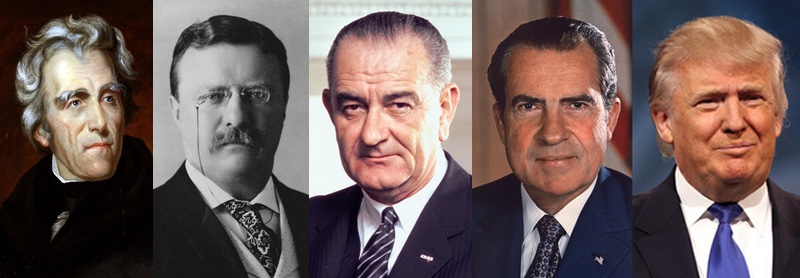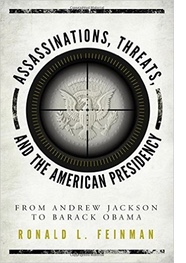How Does Trump Compare with the Worst Egotists We’ve Elected to the Presidency?

It is well known that very bright, intelligent, and gifted people often have major mental issues, and can be insufferable. But if a public intellectual, such as a poet, playwright, novelist, musician, actor, or athlete is such, while it may be an issue for those around them, it has little direct effect on the American people.
But if such a person is competing for the Presidency, or is an occupant of the Oval Office, it is a much more disturbing and dangerous scenario, particularly in an age of nuclear weapons, terrorism, and domestic discontent leading to rejection of the established political order. Such is what is now faced with the meteoric rise of businessman Donald Trump, who is seen by many as narcissistic. He displays delusions of grandeur, often seems not to grasp reality, and doesn’t understand the limits the Constitution places on the president and the Congress.
Would Donald Trump be the first President to display such traits of egomania and narcissism? The answer is clearly negative, as one can observe that Andrew Jackson, Theodore Roosevelt, Lyndon B. Johnson, and Richard Nixon all had elements in their personalities that resembled the characteristics that Trump clearly has, but none on his – Trumpian – scale.
 Andrew
Jackson had a mercurial personality, and his temper and belief in his
own superiority helped lead to rash actions. When President James
Monroe ordered the invasion of Spanish Florida in 1818, Jackson went
ahead and burned down Seminole towns, including Tallahassee; and when
he found two British nationals (Alexander Arbuthnot and Robert
Ambrister) in Spanish Florida, he ordered summary justice, leading to
their execution, without consulting President Monroe or Secretary of
State John Quincy Adams, causing an international controversy with
the nation we had recently engaged in war from 1812-1815. This caused
political conflict with both John Quincy Adams and John C. Calhoun
(Secretary of War), who became his major political rivals during the
next two decades of his national political life. Jackson’s
readiness to lead an invasion of South Carolina during the
Nullification Crisis in 1832-1833 only was prevented by compromise
promoted by Kentucky Senator Henry Clay, another political rival,
after their election contest for Jackson’s second term in 1832.
Jackson’s repudiation of the Supreme Court ruling concerning the
right of Native American to their ancestral lands, which led to the
Trail of Tears (one of the most reprehensible Presidential actions in
all of American history), undermined the rule of law. His
determination to destroy the Second National Bank of the United
States, leading to the Panic of 1837, helped to defeat his favored
successor, Martin Van Buren, when he ran for reelection in 1840, as
Van Buren could not easily repudiate his mentor’s actions on the
economy. In many ways, Jackson may have been the most dangerous
President until Richard Nixon 140 years later.
Andrew
Jackson had a mercurial personality, and his temper and belief in his
own superiority helped lead to rash actions. When President James
Monroe ordered the invasion of Spanish Florida in 1818, Jackson went
ahead and burned down Seminole towns, including Tallahassee; and when
he found two British nationals (Alexander Arbuthnot and Robert
Ambrister) in Spanish Florida, he ordered summary justice, leading to
their execution, without consulting President Monroe or Secretary of
State John Quincy Adams, causing an international controversy with
the nation we had recently engaged in war from 1812-1815. This caused
political conflict with both John Quincy Adams and John C. Calhoun
(Secretary of War), who became his major political rivals during the
next two decades of his national political life. Jackson’s
readiness to lead an invasion of South Carolina during the
Nullification Crisis in 1832-1833 only was prevented by compromise
promoted by Kentucky Senator Henry Clay, another political rival,
after their election contest for Jackson’s second term in 1832.
Jackson’s repudiation of the Supreme Court ruling concerning the
right of Native American to their ancestral lands, which led to the
Trail of Tears (one of the most reprehensible Presidential actions in
all of American history), undermined the rule of law. His
determination to destroy the Second National Bank of the United
States, leading to the Panic of 1837, helped to defeat his favored
successor, Martin Van Buren, when he ran for reelection in 1840, as
Van Buren could not easily repudiate his mentor’s actions on the
economy. In many ways, Jackson may have been the most dangerous
President until Richard Nixon 140 years later.
Theodore Roosevelt loved public attention so much that he felt a need to comment on everything and everyone in his lifetime. He was boastful on a regular basis and tried to make news headlines in every possible manner. He engaged in what many called “cowboy diplomacy” toward Latin America, with interventions in Cuba and the Dominican Republic, pursuing what came to be called Big Stick Diplomacy. He bragged about “building” the Panama Canal after arranging a treaty that was foisted on the new Panama nation, leading to great resentment in that country. He became engaged in a very divisive and contentious Presidential campaign against his own chosen successor, President William Howard Taft, in 1912, using insults not all that different from what we’ve heard from Donald Trump against his Republican rivals for the 2016 nomination. He was ready to lead troops to fight Kaiser Wilhelm II of Germany during the Great War had President Woodrow Wilson, whom TR hated with a passion, allowed it. He craved the praise that foreign governments gave to him when he toured European capitals after his Presidency. He challenged the norms of what a President could do domestically, expanding the definition of Presidential power, seen as significant and historic, but also questioned by many over time. His ego was driven also by his own insecurities, which he had developed in childhood from bouts with asthma and poor eyesight, which made him want to be noticed and respected. Always a colorful character, one has to wonder how he would have led the nation into World War I, had he been elected in 1912. Would he have handled the issue of domestic criticism and opposition any different from fellow progressive Woodrow Wilson, whom history chastises for violating civil liberties?
Lyndon B. Johnson was another colorful character in the Oval Office. He gave his daughters names that corresponded with his own initials: LBJ. He was infamous for being overbearing with legislators in private meetings, and aggressive and belligerent toward critics in the news media and in Congress. He overworked his staff. He lived and breathed politics all the time. He had a reputation of practicing “in your face” politics and intimidated critics of the Vietnam War. His unwillingness, until 1968, to listen to others who advised him to change his Vietnam War policy doomed the United States in Vietnam. His policy led to one of the major failures any President has sustained while in office. Even with his tremendous ego, he also had a clear sense of his own insecurities and weaknesses, and at times, it made him drink and smoke and swear too much. LBJ was a man of great accomplishments, but also great shortcomings, and he was dogged by a desire to be loved by the American people.
Richard Nixon was, without question, the most dangerous man ever to occupy the Presidency. Born into poverty, he never overcame his resentment of wealthy people, such as the Rockefellers and the Kennedys. He had very low self esteem as part of his basic nature, and saw his opponents and critics as his enemies and used the power of the Presidency to gain revenge on them. He gathered loyalists around him who would do his bidding. More than any other President he found it hard to deal with the news media. (One wonders how he would have handled the 24-hour news media of the 21st century.) He worked to cover up much of what he ordered the military to do in Southeast Asia and saw no problem violating morals or ethics when the national interest, as he perceived it, required it. He ordered break-ins and wiretapping on a massive scale and had an “enemies list,” which was used by the Federal Bureau of Investigation and the Internal Revenue Service to harass his critics. People high up in the government worried that he might declare martial law during Watergate. He didn’t, but we came very close to this threat becoming reality, and that is why Watergate is thought to be the third greatest crisis in American history, after the Civil War, and the Great Depression and World War II.
Now we face the growing danger of Donald Trump, who is perceived by this author (see my previous article about Trump on HNN) as the most dangerous Presidential candidate in American history. Many conservatives, as well as progressives and neutral observers, see Trump as a Fascist, who appeals to the fears, anxieties, and prejudices of those with less education and economic stature. Trump builds up the fear of Muslims and Hispanics with his nativism and racism. He promotes the disrespect of women with his misogyny, and promises everything will be fine in both domestic and foreign policy, even though he has given no real specifics on any of the issues. His bluster and braggadocio are totally out of line for any President, yet Trump seems not to realize that every word he utters leads to false assumptions and confusion that could undermine America’s worldwide image.
His recent comments on foreign policy have caused great alarm among experts in diplomacy, defense and national security. Among other wild statements, he has suggested ending the North Atlantic Treaty Organization as the major bulwark of American foreign policy and backed the spread of nuclear weapons to Japan and South Korea. He has praised Vladimir Putin and suggested he’d be willing to meet with Kim Jong Un of North Korea. Trump’s use of insults against anyone who is critical of him, and his threats to curb freedom of the press and freedom of speech against his naysayers, is terrifying. The Presidency is not a place for a novice like Trump, who would enter the Presidency as a “blank slate” with no real understanding of major public issues.
The one common theme among Andrew Jackson, Theodore Roosevelt, Lyndon B. Johnson, and Richard Nixon are their years in the military and in government and their knowledge, even when they engaged at times in deplorable behavior. But with Donald Trump, who has zero military and government experience, and is the most ignorant Presidential nominee in American history, we are dealing with a candidate who has more of a “mobocracy” following, similar to those who stormed the White House at the Inauguration of Jackson in 1829. It is reasonable to fear that events could unhinge Trump.
The American Republic could be facing its greatest constitutional threat since Richard Nixon in 1974, and yet there is still time to prevent this from happening, and that is the responsibility of all of us in the historical community to make clear to everyone that Donald Trump has no magic potion, and no simple answers to the complex world we live in, and that we can ill afford to put this potential demagogue into the Oval Office.